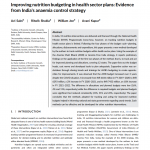
An application that did not go up in smoke – e-Governance and the Tobacco Board
2 February 2018
This blog is part of a series on the rollout and progress of e-Governance in India.
My four year stint in the Tobacco Board as Director (Auctions) was where I finally saw e-Governance making a big difference to the lives of people who dealt with the government.
A few disclaimers, before I begin my story.
The Tobacco Board is a government of India body that assists tobacco farmers to grow and sell tobacco. Before one throws up one’s hands in horror at this, lets dwell on the fact that the government is concerned with all interests of people; so while on the one hand, it actively campaigns against smoking, it also cannot be blind to the fact that considerable numbers of farmers depend upon cultivation of tobacco for their livelihoods. If and when tobacco use diminishes, the farmers will look for other alternatives. However, as long as people do smoke, in the face of health warnings given by the government, one cannot overlook the fact that tobacco will be grown. And if it is so grown, the government takes on the responsibility that farmers don’t get short-changed for their produce.
Indian policy has been that government regulates the cultivation of tobacco, by licencing farmers to produce a limited quantity every year. The government does not take on the responsibility of buying all the tobacco produced; on the other hand, all it does is to run auctions where registered farmers sell to registered buyers. Tobacco is a high priced product and the proper grading and weighing of produce is the key to ensuring that farmers receive a fair price. Auction halls during the season are a hubbub of activity. At least a thousand farmers come to each auction hall daily. The halls open as early as three in the morning, so as to ensure that all the tobacco bales put out for auction are ready for inspection and auction starting from eight in the morning. An early start is necessary to ensure that the auction is finished in the morning light; experienced buyers say that afternoon light is not right for assessing the colour of the tobacco, a key parameter of quality. Usually, by 12 PM, the auctions are over and the sellers wait to receive their payments.
In the early 1990s, the Tobacco Board was one of the first institutions in the government to embrace e-Governance. All bales were physically inspected jointly by the buyer, the seller and the quality assessor provided by the Board. An agreed upon description of the bale; its weight, colour, moisture content and quality, were recorded in a ‘bale ticket’ placed on each bale. The auction proceeded after all bales were marked. After each bale was auctioned, the details of the winning bidder and the price quoted was also entered into the bale ticket. Once the auction was finished, all details on the bale tickets were entered into the auction software, which then proceeded to print out debit notes for buyers, indicating the debiting of their bank accounts by the appropriate amounts and payment cheques that were handed over to each seller. The software also churned out reports that kept tab on all essential statistics on the buying and selling; the quality, the quantities sold, the financial values, all on a daily and cumulative basis.
By today’s standards, the state of the art computing technology of those days was laughable. Simple PCs with no hard discs and minimal RAM were used to churn the numbers. As the auctions progressed, computing times took longer, particularly to prepare cumulative reports. By the end of the four or five month auction season, processing time would be more than three hours. We kept our fingers crossed, because a tiny blip in the power supply could corrupt the calculations and one would have to start all over again. When we upgraded to the latest PC-ATs in 1995, we exulted, because the computing time at the end of the season was reduced from several hours, to a few minutes.
Yet, in spite of the obvious benefits of e-Governance, one could not help but noticing how power equations were changing, due to technology. The computer operator was the key to the integrity of the system and like any other lesser mortal, he could be compromised. Since the system set quotas and imposed upper limits on what a farmer could sell, the software automatically rejected sales where farmers exceeded their set quotas. It took very little time for computer operators to hack the software. Then, for a price, farmers who exceeded quotas would be able to sell their extra tobacco.
The hacking was so elementary, that an equally elementary safeguard sufficed to snuff it out. I got a software written that would automatically scour through the sales and list out all sales where quotas were exceeded. I carried that software on a floppy disc; it was given only to a few senior people. A few random checks discovered the main transgressors. Once caught red-handed, the erring data entry operators were punished. The software soon became an effective instrument of deterrence; merely letting data entry operators know that their bypassing of the quota rule could be instantly detected, was enough to make them cautious.
Like all robust e-Governance solutions, the Tobacco Board’s system continues to do well even today. Regular upgrades have made matters even simpler; data entry operators have very little to do after the introduction of bar coded bale tickets. Cheques are no longer printed; the amounts paid by buyers are transferred to the bank accounts of sellers. The linkage to bank accounts also provides assurance to the Tobacco Board to raise loans on behalf of sellers, to obtain fertiliser and other inputs in bulk and resell them to the buyers.
The Tobacco Board’s system has features that are typical of many good e-Governance solutions. It has kept things simple; it constantly has upgraded itself and it has worked to reduce discretion and effort. Most important, it has kept farmers and buyers at the centre of its focus, not the Board or its data entry operators
The views expressed are of the author. Accountability Initiative does not encourage tobacco use in any way.





